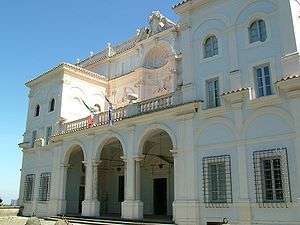Orazio Falconieri
Orazio Falconieri (died 1664) was an Italian nobleman from Florence; he was the owner of the Villa Falconieri. His heraldic symbol was a falcon[1]


Family
Falconieri was the son of Paolo Falconieri and Maddalena Albizzi and the brother of Lelio Falconieri[2] who was later elevated to Cardinal.
In 1615 he married Ottavia Sacchetti (1590–1645), sister of Cardinal Giulio Cesare Sacchetti[3] who would later consecrate Orazio's brother Lelio. The Sacchetti and Falconieri were already close; Orazio's father had made his fortune importing salt and as a result Orazio had business connections to Ottavia Sacchetti's father. When Ottavia's first husband, Piero Alberti, died, marriage to Orazio was considered an excellent option for both families.[4] Records indicate they had at least one son (Paolo Francesco Falconieri) who took ownership of the Villa Falconieri and took his father's titles.[5]
Commissions
Falconieri purchased the Villa Falconieri and commissioned Francesco Borromini to renovate it. Orazio later commissioned Borromini to renovate the church of San Giovanni dei Fiorentini to build a Falconieri family chapel for his burial and the burial of his brother Lelio Falconieri.[6]
References
- The architecture of Rome: an architectural history in 400 presentations by Stefan Grundmann & Ulrich Fürst (Axel Menges, 1998)
- S. Miranda: Falconieri
- Ave Papa/Ave Papabile: the Sacchetti family, their art patronage, and political aspirations by Lilian H. Zirpolo (Centre for Reformation and Renaissance Studies, 2005)
- Marriage in Italy, 1300-1650 by Trevor Dean & K. J. P. Lowe (Cambridge University Press, 2002)
- INVALSI: Villa Falconieri
- Borromini by Anthony Blunt (Harvard University Press, 1979)